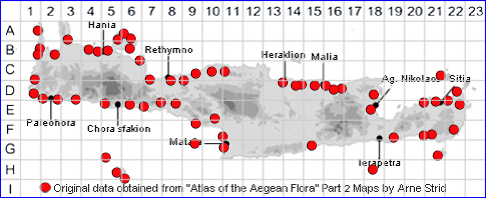
SILENE SEDOIDES subsp. SEDOIDES
Family:- CARYOPHYLLACEAE/Sect. ATOCION
Common Names:- Hairy catchfly
Synonyms:- Silene delicatula, Silene ramosa.
Meaning:- Silene (Gr) A name used by the Greek philosopher Theophrastus for
catchfly.
Sedoides (L) Resembling sedum.
General description:- Low to short tufted, densely hairy annual with slender
stems, sticky above.
Stems:-
1) 5-20(-30) cm, usually much-branched, erect, slender, densely pubescent with
patent hairs.
Leaves:-
1) Opposite, simple, elliptic, entire, 10 mm long at most, very hairy, green or
reddish, often succulent.
Flowers:-
2) Petals, small, often slightly notched.
4) Pedicels, 1-3 cm, often bent upwards just below the calyx, in fruit.
5) Coronal-scales, white.
6) Bracts, leaf-like, green.
pubescent, greenish, rarely reddish;
Fruit:-
grooved.
Key features:-
1) Seeds reniform. 0·3-0·5 mm.
2) Pedicels patent in fruit, slender, usually longer than the calyx.
3) Calyx 6-9 mm.
Habitat:- Rocky coastal habitats, rarely along roads and tracks and in dry open
shrubby vegetation some distance inland up to 400 m.
Distribution:- Distributed around the central and eastern Mediterranean coasts,
extending to easternmost Spain, and is particularly common in the Aegean region.
Widespread and common around the coastal regions of Crete.
Flowering time:- Late Mar to mid-June.
Photos by:- Steve Lenton
SPECIES DESCRIPTION
